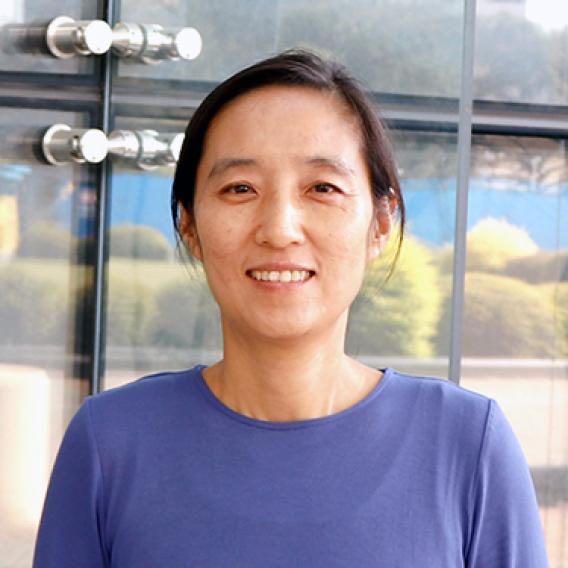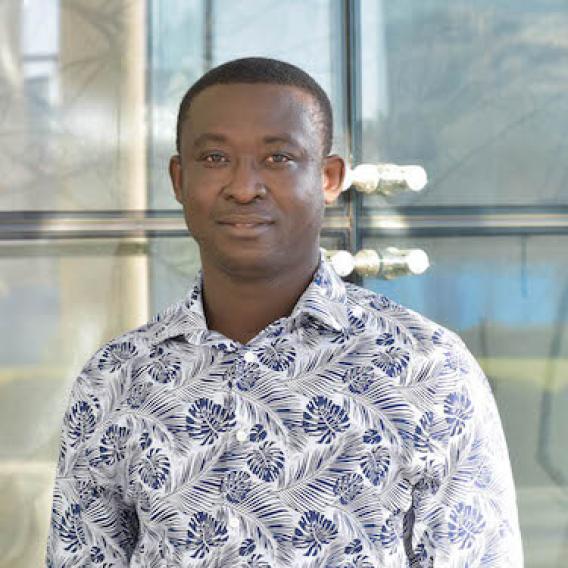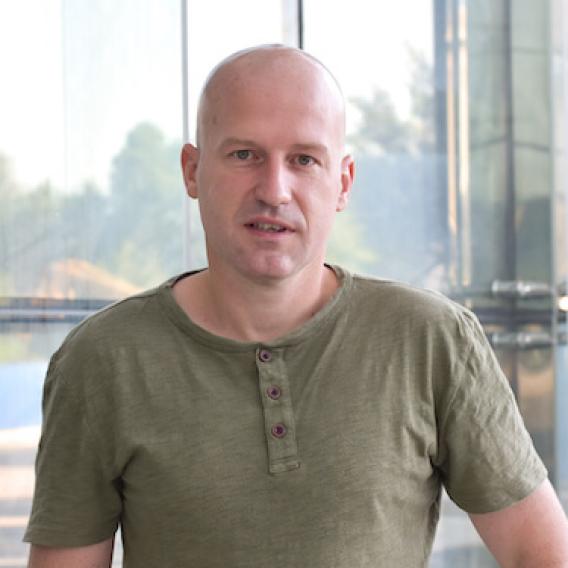Research Focus
We are interested in the relationship between metabolism and cell type. We focus on the metabolism of hematopoietic stem cells (HSCs) and their progeny, including cells of the myeloid and T cell lineages. To assess cell type specific metabolism, we have developed techniques to measure metabolites in stem cells and other rare cells isolated from tissues (Nature 549, 476-481, 2017 and Cell Metabolism 33, 1777-1792, 2021). We aim to understand how metabolism affects hematopoiesis, leukemia development, and the host’s response to infection.
Principal Investigator
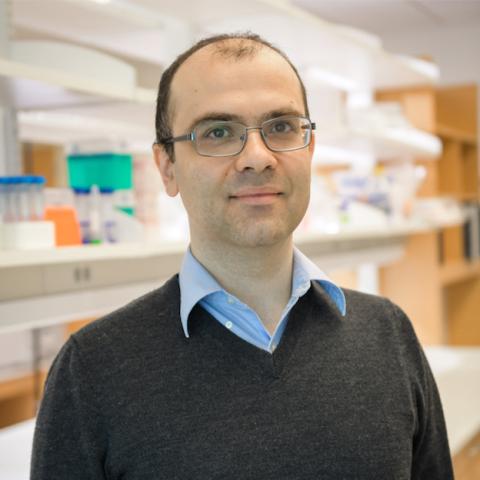
Michalis Agathocleous, Ph.D.
Dr. Michalis Agathocleous earned his B.A. and Ph.D. degrees at the University of Cambridge, where he studied embryonic retinal development with Dr. Bill Harris. He was a Research Fellow at Gonville and Caius College, University of Cambridge, where he worked on the metabolism of embryonic retinal stem and progenitor cells. He was then an 1851 Research Fellow with Dr. Sean Morrison in Children’s Medical Center Research Institute at UT Southwestern (CRI), where he worked on the metabolism of hematopoietic stem cells and leukemia cells.
He joined CRI as an Assistant Professor in 2017. Dr. Agathocleous is a Cancer Prevention and Research Institute of Texas Scholar (2017), a recipient of the Alex’s Lemonade Stand Foundation ‘A’ Award (2018), and an American Society of Hematology Scholar (2020).
Current Lab Members
Lab Alumni
Sojeong Jun, Ph.D.
Scientist, Moderna
Ph.D. Student (2017-2021)
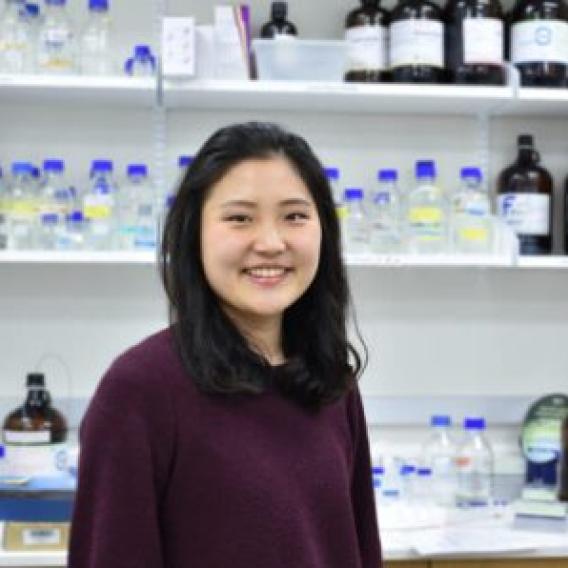
Swetha Mahesula, M.S.
Staff Scientist, UC San Diego
Lab Manager (2018-2020)
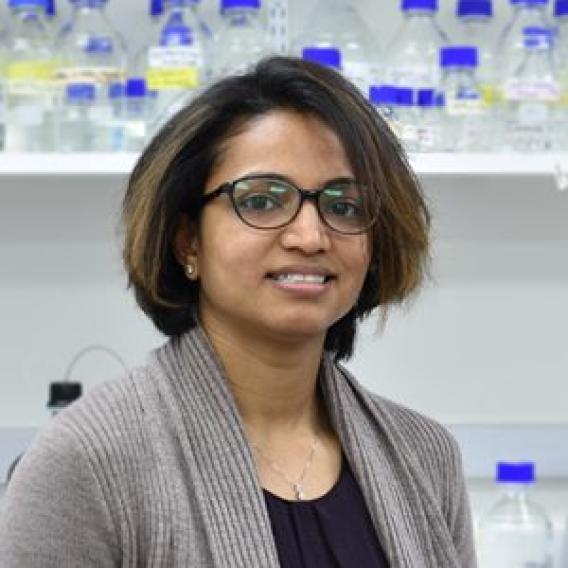
Landon Nguyen, B.S.
Graduate Student, UC San Francisco
Research Assistant (2019-2020)

Trey Rose, B.S.
Cell Engineer, Colossal Laboratories & Biosciences
Research Engineer (2020-2024)

Jacob Zielke, B.S.
Graduate Student, UT Southwestern Medical Center
Research Assistant (2022-2024)

Research Projects
How do metabolic pathways operate in stem cells? We have shown that in the hematopoietic system, cell differentiation is accompanied by metabolic differentiation. Each hematopoietic cell type has a distinct metabolic signature. Almost all metabolites show cell type-specific enrichment patterns, mostly for unknown reasons. We are interested in understanding why different cell types have different kinds of metabolism, and in uncovering novel roles for metabolites in hematopoietic stem cells and other hematopoietic cell types.
We are interested in understanding the metabolism of myelopoiesis. In infections, myeloid cells produced from hematopoietic stem cells and myeloid progenitors can fight pathogens but may also damage host tissues. We are investigating the impact of hematopoietic and myeloid cell metabolism on the host’s response to infection.
Cancer cell metabolism is determined by driver mutations, the environment, and the tissue of origin. We have shown that the requirement of leukemia cells for pyruvate oxidation is determined by the metabolism of the progenitor cell of origin. Pyruvate oxidation is required in double-positive thymocytes and in T cell acute lymphoblastic leukemia cells but not in hematopoietic stem cells, myeloid progenitors, other hematopoietic cells, or myeloid leukemia cells. We are working to understand the cell type specificity of central carbon metabolism. More broadly, we aim to uncover leukemia-specific metabolic requirements.
Publications
Loss of vitamin C biosynthesis protects from a parasitic infection.
Chen G, Jun JH, Wijshake T, Li Y, Yuan M, Rose J, Li S, Cobb S, Serpa W, Li Y, Li L, Chen W, Collins JJ, Wang J, Agathocleous M, 2025 Jul bioRxivThe requirement for pyruvate dehydrogenase in leukemogenesis depends on cell lineage.
Jun S, Mahesula S, Mathews TP, Martin-Sandoval MS, Zhao Z, Piskounova E, Agathocleous M, 2021 Aug Cell MetabAscorbate regulates haematopoietic stem cell function and leukaemogenesis.
Agathocleous M, Meacham CE, Burgess RJ, Piskounova E, Zhao Z, Crane GM, Cowin BL, Bruner E, Murphy MM, Chen W, Spangrude GJ, Hu Z, DeBerardinis RJ, Morrison SJ 2017 Aug NatureOxidative stress inhibits distant metastasis by human melanoma cells.
Piskounova E, Agathocleous M, Murphy MM, Hu Z, Huddlestun SE, Zhao Z, Leitch AM, Johnson TM, DeBerardinis RJ, Morrison SJ 2015 Oct NatureA nutrient-sensitive restriction point is active during retinal progenitor cell differentiation.
Love NK, Keshavan N, Lewis R, Harris WA, Agathocleous M 2014 Feb Development 3 141 697-706The physiological functions of ascorbate in the development of cancer.
Agathocleous M, 2025 Apr Dis Model Mech 4 18Maternal vitamin C regulates reprogramming of DNA methylation and germline development.
DiTroia SP, Percharde M, Guerquin MJ, Wall E, Collignon E, Ebata KT, Mesh K, Mahesula S, Agathocleous M, Laird DJ, Livera G, Ramalho-Santos M, 2019 09 Nature 7773 573 271-275Metabolism in physiological cell proliferation and differentiation.
Agathocleous M, Harris WA 2013 Oct Trends Cell Biol. 10 23 484-92From progenitors to differentiated cells in the vertebrate retina.
Agathocleous M, Harris WA 2009 Annu. Rev. Cell Dev. Biol. 25 45-69A general role of hedgehog in the regulation of proliferation.
Agathocleous M, Locker M, Harris WA, Perron M 2007 Jan Cell Cycle 2 6 156-9Lab News

February 20, 2025
CRI’s Agathocelous, McBrayer awarded $2M+ for cancer research by CPRIT
Read the article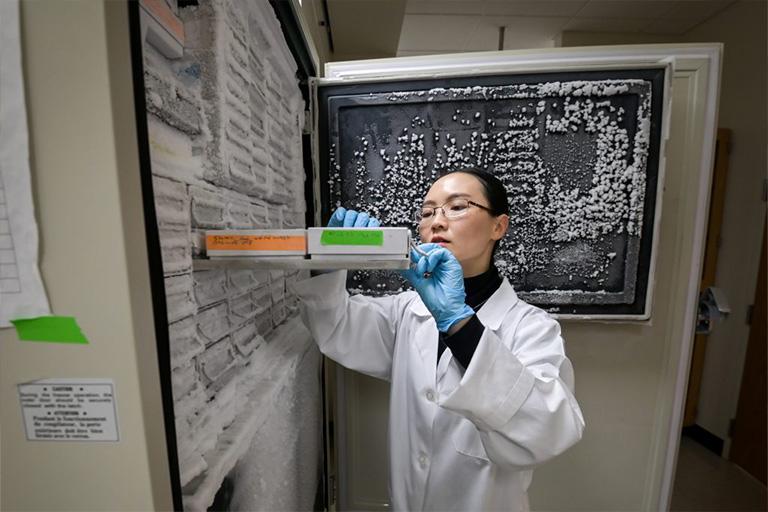
March 1, 2024
Li receives 2024 ASH Scholar Award to research stem cells
Yafeng Li, Ph.D., an Assistant Instructor in CRI’s Agathocleous Lab, was one of 5 recipients of the American Society of Hematology’s 2024 Fellow to Faculty Scholar Award.
Read the article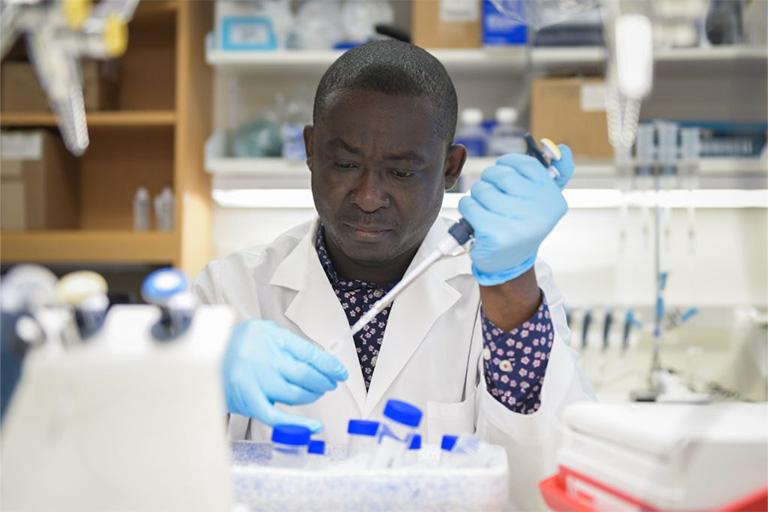
October 25, 2023
Edward Owusu Kwarteng Awarded Minority Hematology Fellow Award from ASH
Edward Owusu Kwarteng’s, Ph.D., interest in hematological research began while volunteering at a medical diagnostic lab in his home country of Ghana.
Read the article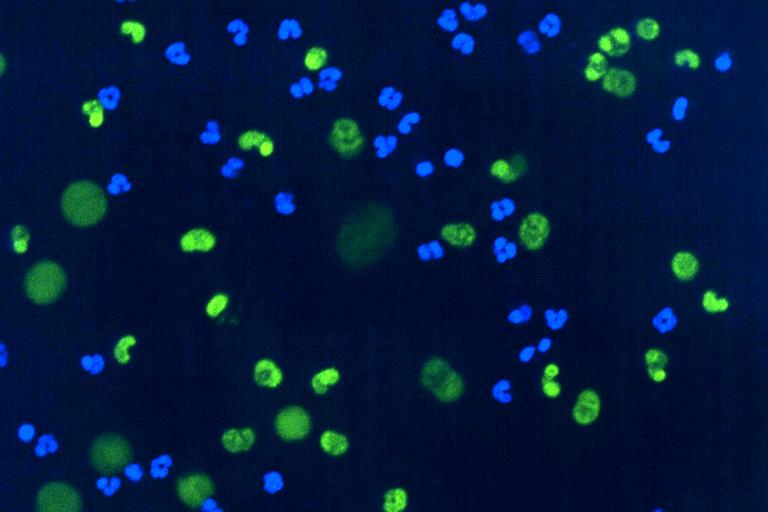
May 5, 2023
The metabolism of neutrophils and its contribution to severe COVID-19
Metabolic changes in neutrophils, the most abundant type of white blood cell, may contribute to severe COVID-19, according to scientists at Children’s Medical Center Research Institute at UT Southwestern (CRI).
Read the article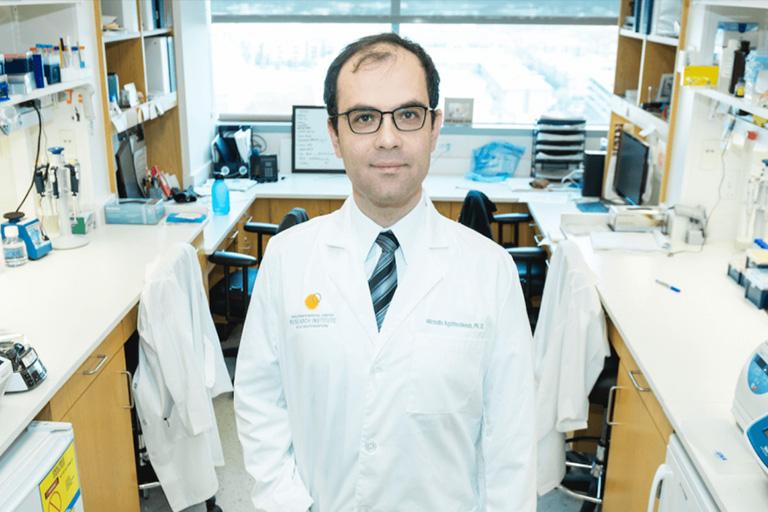
August 10, 2021
Metabolic differences in cancer cells may be driven by cell of origin
The metabolic differences observed between cancer and normal tissue are often thought to reflect the reprogramming that occurs during cancer formation.
Read the article
January 14, 2020
American Society of Hematology selects Michalis Agathocleous to receive 2020 Scholar Award
Michalis Agathocleous, an assistant professor at the Children’s Medical Center Research Institute (CRI) at UT Southwestern, has been selected by the American Society of Hematology (ASH) to receive one of ASH’s most prestigious award programs - the ASH Scholar Award
Read the article
October 23, 2017
NBC: Can vitamin C prevent leukemia?
Here’s another reason to make sure you’re eating plenty of vitamin C: Two new studies out in the past week show that the vitamin may help prevent blood cells from going bad and causing some types of leukemia.
Read the article
August 23, 2017
The Scientist: Vitamin C depletion accelerates leukemia in mice
Ascorbate, also known as vitamin C, plays a key role in determining whether blood-forming stem cells will become cancerous, according to a study of cell cultures and mice published today (August 21) in Nature.
Read the article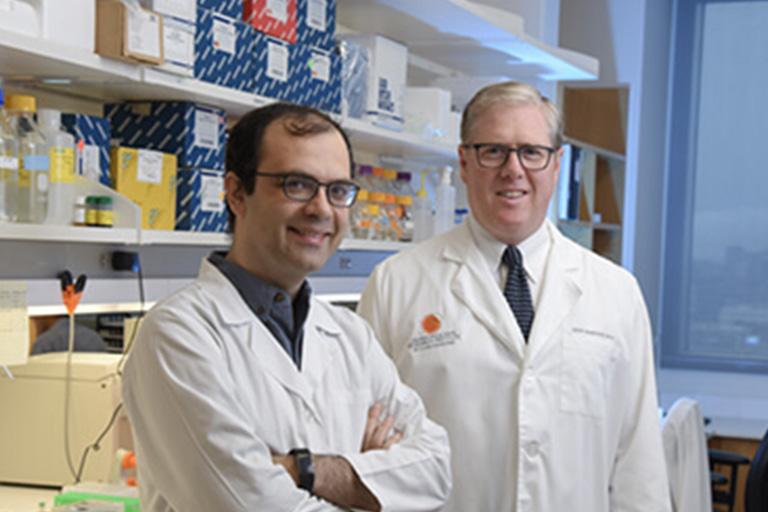
August 21, 2017
CRI scientists discover vitamin C regulates stem cell function and suppresses leukemia development
Not much is known about stem cell metabolism, but a new study from the Children’s Medical Center Research Institute at UT Southwestern (CRI) has found that stem cells take up unusually high levels of vitamin C, which then regulates their function and suppresses the development of leukemia.
Read the article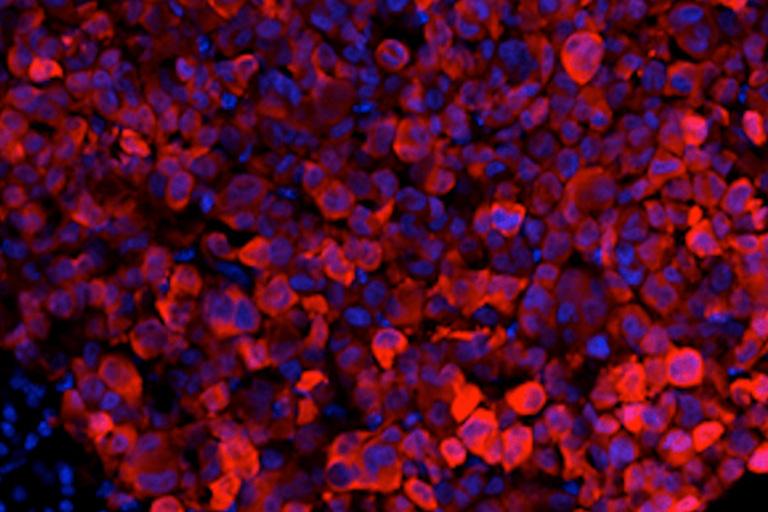
October 14, 2015
Antioxidant use may promote spread of cancer
A team of scientists at the Children’s Medical Center Research Institute at UT Southwestern (CRI) has made a discovery that suggests cancer cells benefit more from antioxidants than normal cells, raising concerns about the use of dietary antioxidants by patients with cancer.
Read the article